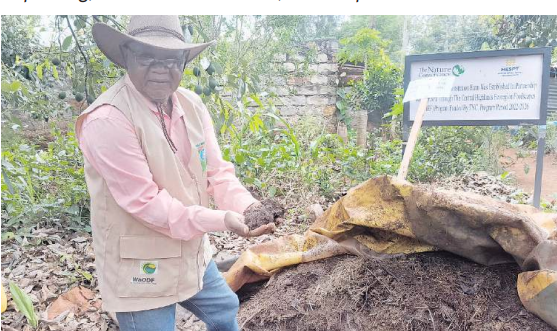

John Kamande, popularly known as Mr Organic, believes retirement does not mean slowing down. After retiring in 2019 from teaching, he turned to farming.
This time, he took a bold step into agroecology. Kamande embraced sustainable practices, choosing to avoid chemicals on his farm.
“After retiring, I came back to farming. That’s when I truly got involved with organic farming,” he says.
His passion for farming deepened when he connected with like-minded individuals who introduced him to organic farming practices and institutions.
A pivotal moment in Kamande’s journey was a trip to Senegal. It was organised by the Kenya Institute of Organic Farming. This experience profoundly intensified his commitment to organic farming and led him to join Afronet, a pan-African organisation promoting sustainable agricultural practices.
“I learnt a lot in Senegal and it changed how I viewed farming,” he says. Today, Kamande runs Wakas Organic Demonstration Farm, a thriving example of how farming can be productive and sustainable.
The farm is in Manyatta village, Maragua subcounty, Murang’a county. Farmers from Kenya, Africa and Europe visit his farm to learn the benefits of organic agriculture. He has hosted farmers from at least seven European countries and eight African nations, and the demand for training continues to grow.
“I’m now training farmers from 27 Kenyan counties and other African nations,” he says. “They come to see the benefits of organic farming and learn techniques they can apply on their farms.”
Kamande says he has become an advocate for agroecology, which is not expensive or difficult. “Once you understand it, agroecology and organic farming are not only good for your health, but are also economically viable,” he says.
His farm thrives on composting, homemade fertiliser and natural pest control methods. “Some people think organic farming is expensive but it’s actually the opposite. What we’re doing here is regenerating the soil and growing food that’s good for your body and the environment,” Kamande explains.
His techniques include vermiculture (using worm castings as fertiliser) and plant-based pesticides. He grows avocados, bananas, potatoes, and herbs like ginger, turmeric and rosemary, all without chemicals. His avocado farm is certified organic and he sells his produce to export companies.
“I sell to companies that export to Europe and I get a good price, sometimes up to Sh150 per kilogramme.”
His commitment to organic methods has paid off, not only in terms of income but also in the health of his farm and the vitality of his community. At 71, Kamande shows no signs of slowing down.
“My farm is my passion. I have goats, I have chickens, I make my own liquid manure and I’ve never felt more fulfilled in my life,” he says.
Kamande is also raising awareness on the importance of pollinators like bees and the dangers of chemical pesticides.
“I’ve learned that we need pollinators more than anything,” he says. “Without them, we wouldn’t have the crops we rely on. That’s why I encourage farmers to avoid chemicals and plant flowers to attract these vital creatures.”
When asked about the challenges he faces, Kamande acknowledges that farming is never without hitches. “We sometimes have rain shortage and irrigation systems can fail,” he says.
“But I’ve learned to adapt. You have to be resilient in farming, just like in life.” Kamande’s message to farmers is that organic farming is the future.
“It’s a way of farming that works with nature, not against it. It’s about preserving our soil, growing healthy food and ensuring we have something to pass on to the next generation,” he says.
“We are facing climate change and the land is not what it used to be. But if we return to organic practices, we can restore the health of our soil and our communities.”
Anne Maina, the national coordinator of the Biodiversity and Biosafety Association of Kenya, says Wakas Demonstration Farm is an exemplary case of a farmer practicing agroecology, which is both a science and a movement.
In 2024, Kenya introduced its National Agroecology Strategy and is now working on a monitoring and evaluation framework.
“We aim to take it to the next level, where farmers will actively practice and promote agroecology,” she says.
Maina says in 2022, Murang’a County passed an agroecology policy and has since implemented systems to ensure sustainable farming practices.
“This is especially crucial given the challenges posed by climate change, soil degradation from excessive synthetic fertilisers and highly hazardous pesticides. We are promoting a transition from agriculture dependent on synthetic inputs to one focused on sustainable practices that regenerate soils and strengthen Kenya’s food systems,” she says.
Advocates for agroecology are calling for policy support and investment to transform food systems. At the African Agroecology Workshop (AAW 2025) in Sagana, Murang’a county, more than 100 participants from 22 African countries demanded urgent action to support sustainable, equitable and resilient food production.
The participants representing smallholder food producers, civil society organisations, researchers and policymakers, argued that agroecology is more than a farming method. They said it is a movement that prioritises people, nature and local knowledge over profit-driven industrial agriculture.
They urged governments to prioritise agroecology by developing and funding policies that support smallholder farmers, seed sovereignty and sustainable food production.
They want African governments to follow Senegal’s lead by allocating at least 50 per cent of their agricultural budgets to agroecology, supporting farmer-managed seed systems and rejecting corporate control of seeds.
Additionally, they advocated for agroecological solutions to climate change to enhance resilience.







